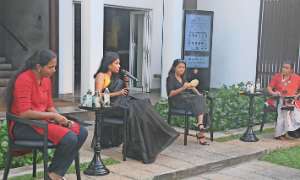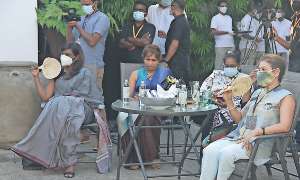
Mar 04 2021.
views 363Kicking off the first of four consecutive Mondays which sees interesting panel discussions applicable to the modern Sri Lankan woman, The Peace Prompters delivered an interesting and thought-provoking discourse between Author and Researcher – Peacebuilding and Reconciliation Sarah Kabir, Writer, Researcher and Activist Amalini De Sayrah and Director for Legal and Advocacy NCEASL Yamini Ravindran.

A coterie of women and a sprinkling of men gathered at Lake Lodge, a small luxury boutique hotel in the heart of the city to participate in the first session titled The Peace Prompters which was moderated by Savithri Rodrigo the founder and creator of the online digital programme Kaleidoscope who has joined forces with Taru, from Table by Taru at Lake Lodge to host Cargills International Women’s Day Festival - The Changemakers.
Warming to the theme of women as peacebuilders the speakers spoke passionately about their roles as peacemakers and prompters and also the challenges they face in executing their work. Addressing the question if women being agents of change is simply rhetorical, Yamini observed that Women have always been change-makers despite the many challenges they face in doing so. One such challenge that new statistics has revealed that in 2019 women in Sri Lanka had a digital literacy rate of less than 28%. This itself poses a challenge and barrier in today’s context. She also said that “ women have to sacrifice more in everything that they do. Women can only access resources if we give them that space and protection.” Observing that women are actively engaged in peacebuilding Amilani said that “From Puttalam to Jaffna and across the island there are many women’s groups at grassroots levels that are having dialogues and raising issues which need to be addressed”.
In a patriarchal society such as ours, we have witnessed the peace process being primarily driven by males. The panellists were unequivocal in their stance that more women must play a role in the peace process. Yamini opined that society should first understand what peace really is. “A lot of the time we think peace is the absence of war, conflict or violence whereas peace is actually the work involved in dignity and well being for all as individuals. If you look at it from that aspect and the way we look at women involved in peace our perception completely changes We also need to understand the important role women can play in peacebuilding and bring them to that level playing field.”
She further explained “if you take war or violence, women go through that experience very differently to men. Women have insights into violence and war because of the role that they play in the community as wives mothers and guardians. Women can also bring a very unique perspective into possible solutions to conflicts because of their different perspectives. We need to recognise these aspects and affirm women who are already out there effecting change and at the same time enable and encourage women at the community level to come forward and engage. However, in order to encourage them to do so, we need to show them that there is protection if they come forward. When I say protection I mean it in the practical sense with legislative mechanisms structural changes.”
Offering her viewpoint on the need for women to come forward and drive the peace processes, Amilani mentioned that women often find that their reputations and characters are harmed by people in society when they find out that they can be outspoken. She also said, “the physical insecurity and intimidation that come from state structures can also affect many women from coming forward as agents of change.” Women at grassroots levels who are effecting the most amount of change are the ones who have issues with people asking them about their movements and questioning them to a point of intimidation. As much as we say women need to come to the forefront there should also be a tangible mechanism to protect them against intimation. We also need to take into consideration if it is fair to ask women to come to the forefront and be change-makers if there is no mechanism to protect them against intimidation and backlash” she added.
Pitching her thoughts as to why women don’t come forward as much as they should, Sarah opined that “cultural, religious and different social structures that women are part of, play a role in holding them back from becoming peacemakers. However, they can make a change at ground level by teaching their children through the choice of words and actions messages of peace”.
Addressing the question as to how women can get a seat at the table when it comes to reconciliation work, Amilani proffered that despite women getting close to a seat at the table and having contributed at policy level to various discussions and meeting the last two governments released reports which have been gathering dust. This has not instilled much confidence in women who have risked much to share their views and opinions on peacebuilding. “We need more women representative of the various conflict areas at the policymaking tables. We need to put in the effort to bring these women to the front as these are the people who have the real experience and they are ones who can help bring about real solutions to real problems”.
During the panel discussion, one of the important threads that came to the fore was the lack of commitment across the board to push forward peace and reconciliation. “There is very little interest in peace and reconciliation and it has left room for ultra-nationalism to rise up which is very ominous to a climate of peace in Sri Lanka. As much as we would like to blame our leader, we also need to change our mindset and once we do that then we can lead to a more peaceful country” added Sarah.

Another aspect that needed to be addressed in Amilani’s view is the lack of justice to victims. “ In a sense, the perpetrators of crimes especially during the war have not been brought to justice. This brings into question the status of all these commissions and reports. We can’t go forward without addressing these issues. When there are so many unaddressed issues how can communities move forward and reconciliation be facilitated? Accountability needs to prevail” she stressed.
One way of moving forward according to Yamini is through education. “We need to find non-traditional interventions to get the message across. Be in comic books or cartoons, if those streams are effective in getting across messages of peace and co-existence then we should bring in alternative and neutral narratives. We also have to be intentional when we speak to women so that they understand our language.”
Peacebuilding can not only be confined to those who have been victims of war or violence. Instead, each one of us has a role to play in building peace and reconciliation. Summing it up perfectly Sarah added “ we always think everything happens in this bubble in Colombo but a lot is being done at the ground level by women. The privileged amongst us can be the most apathetic instead of being active change-makers. We can create spaces of influence, help make policy and so much more but we often take a back seat. We need to be the change first”.
The next session Day 2 on March 8th features The Pioneers - Women who have chosen to challenge conventional career paths and now lead their disciplines with tenacity and purpose. Panellists are Triad Joint Managing Director Varuni Amunugama Fernando, Hemas Holdings Group CEO Kasturi Chellarajah Wilson and Sri Lanka’s first hip hop artiste Ashanthi de Alwis. The second session on Day 2 titled The Leading Men will begin from 6 pm onwards: Purpose-driven leading global companies, Standard Chartered Bank Sri Lanka, London Stock Exchange Group, Sri Lanka, and Brandix have been re-defining a world of work with gender meritocracy at the helm. It is their experiences, challenges, solutions and ground realities that will be discussed in depth. The panellists are Head of Shared Services Center LSEG Sri Lanka Arjuna Nanayakkara, Group Chief People Officer of Brandix Ishan Dantanarayana and CEO of Standard Chartered Bank Bingumal Thewarathanthri.
Pix by Pradeep Dilrukshana
0 Comments